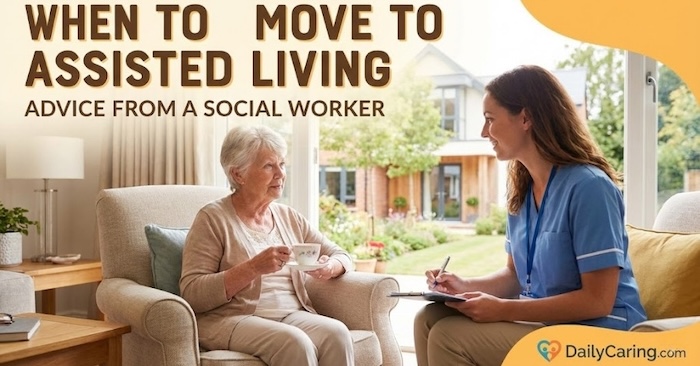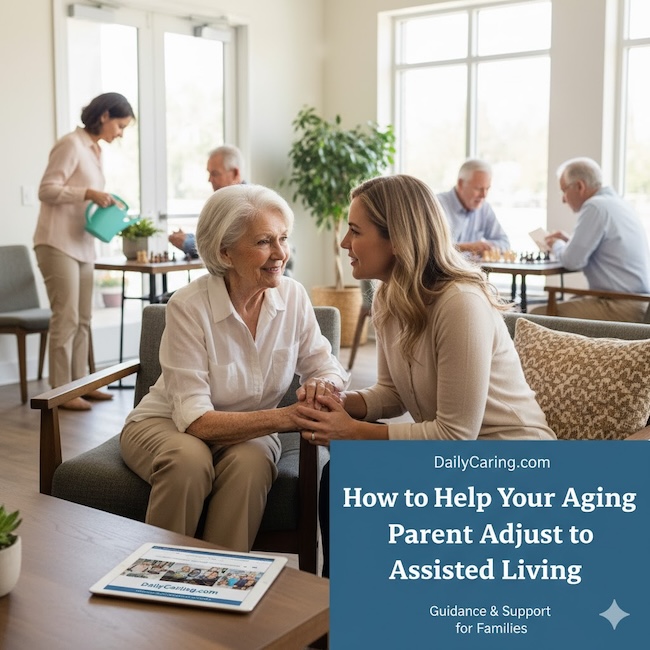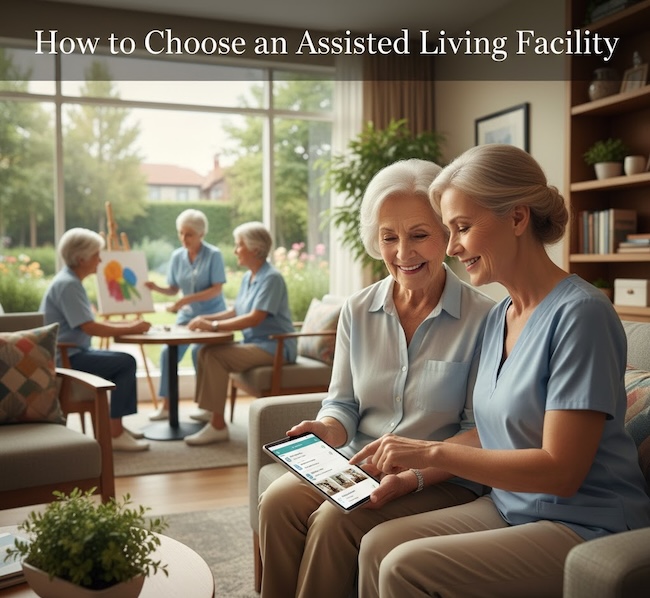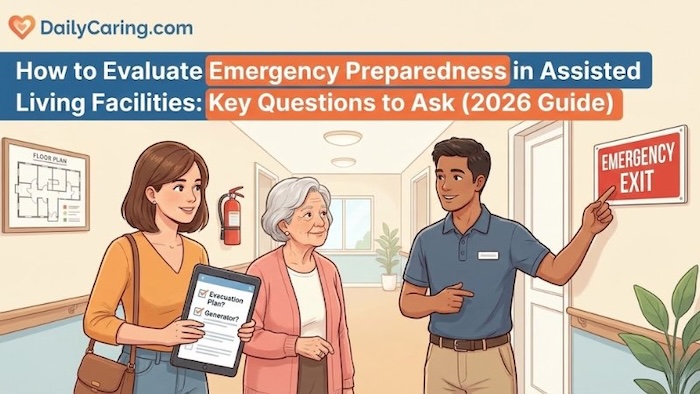The decision to move a loved one to assisted living is often one of the most emotionally complex and heart-wrenching choices a family caregiver will face. It can feel like a crossroads between a promise to keep them at home and the undeniable realities of safety, health, and personal well-being.
You are not alone if this dilemma leaves you feeling guilty, uncertain, or grieving. In this article, an experienced social worker with over 24 years of experience counseling families cuts through the emotional noise.
Florence Marchick shares three essential questions designed to bring clarity, helping you move from overwhelming emotion to informed, compassionate decision-making.

An Experienced Social Worker Shares Advice on When to Move Someone Into Assisted Living
One of the toughest choices a caregiver has to make is the decision to move their aging loved one into an assisted living facility.
Even thinking about it can make someone feel terribly guilty, especially when they’ve promised never to put their loved ones in a “nursing home”.
But keeping that promise isn’t always realistic.
Safety concerns, serious health issues, and specialized care needs are the top reasons to consider assisted living.
To help you make this difficult decision, we asked experienced social worker Florence Marchick for advice.
She’s worked with aging adults and their families for over 24 years, so she has experience counseling many families as they determine which option works best for their older adult.
Below, we're pleased to share Florence's top 3 questions to help you decide whether moving to assisted living is the right choice at this time.
3 Top Questions Help You Decide on Whether to Move a Loved One into Assisted Living
It’s challenging to make a decision when so many conflicting thoughts and emotions cloud your judgment.
To make it easier to answer the question “when does someone need assisted living?” Florence advises focusing on the most important considerations by asking these three questions.
1. Is it increasingly difficult or unsafe to provide hands-on care for your loved one?
What started as a manageable job could have gradually become more than one person can handle alone.
The changes can creep up on you, so now is the time to take a fresh, honest look at your situation.
For example, if your care recipient has become completely incontinent, it could be too much to handle at home.
Or, their aggressive behavior might not be responding to non-drug techniques or medications, putting everyone’s safety at risk.
In some cases, if your older adult needs significant help moving around, assisting them on your own could be dangerous, especially if you’re smaller in size. They could fall, or you could get seriously injured.
2. Does your loved one need specialized care?
If an aging adult's medical condition now requires specialized medical care, or 24/7 supervision, you probably won’t be able to provide that care.
You’re not a medical professional, and it’s simply impossible for one person to be on duty 24 hours a day, 7 days a week.
For example, if your older adult’s dementia causes them to wander constantly (even at night), consider a memory care community where trained staff and a specially-designed environment can keep them safe at all hours.
Additionally, if an older adult is bedridden and needs careful repositioning every hour to prevent bed sores, most people wouldn't be able to provide that care. In this case, 24/7 care at an assisted living community is an excellent option.
3. Do you feel resentful, emotionally drained, or chronically tired?
Caregiver stress and burnout are very real things. It negatively affects your quality of life today and your overall health in the long term.
Have you started hating your aging loved one, feeling overwhelming resentment, not liking who you’ve become, or disliking your own behavior?
Those are all signs that it’s time to make a change.
If you’re in a negative place, it’s not possible to care for your older adult in the calm, positive manner they need.
Consider the Benefits of Assisted Living
Most people say they want to stay in their homes as they age, but it's not always possible.
For the right situation, assisted living facilities or residential care homes can improve the quality of life for older adults and for caregivers alike.
In addition to a safer environment and higher care, your loved one will have the opportunity to be more social and interact with others.
You’ll also be able to return to being their companion and advocate rather than focusing on their physical care.
Final Thoughts on Moving Your Loved One Into Assisted Living
Ultimately, the decision to transition to assisted living is not a failure of love or care, but often its deepest expression. It is an act of courage that prioritizes safety, specialized support, and the long-term health of both your loved one and yourself.
By honestly answering the three key questions, you can shift your perspective: this move is not about giving up a home, but about choosing a new environment where your loved one can thrive with dignity, and you can reclaim your role as a devoted companion.
Let this decision be guided by practical wisdom and profound care, freeing you both to enjoy a higher quality of life and a more meaningful connection in the chapters ahead.
Recommended for you:
- Moving to Assisted Living: 5 Ways to Know When It’s Needed
- How to Choose an Assisted Living Facility: Helpful Checklist and Tips
- 5 Assisted Living Facts You Probably Don’t Know
Florence Marchick holds a Master’s in Social Work and has worked in the field since 1978. For over 24 years, she had worked with older adults. Before her retirement, she was the social worker at Rosener House Adult Day Services program in Menlo Park. This included working with families during the enrollment process, family counseling, and running several support groups for caregivers. Rosener House offers an enriched therapeutic day program in a caring, protective environment. Rosener House promotes independence and dignity for aging adults facing challenges and limitations, including Alzheimer’s, dementia, early memory loss, mild cognitive impairment, stroke, Parkinson’s, and other chronic conditions.
About the Author

Connie is the founder of DailyCaring.com and was a hands-on caregiver for her grandmother for 20 years. (Grandma made it to 101 years old!) She knows how challenging, overwhelming, and all-consuming caring for an older adult can be. She also understands the importance of support, especially in the form of practical solutions, valuable resources, and self-care tips.














I am struggling with the decision of placing my mom into assisted living. We have already signed the paper work and she says she’s ok with it. But I feel like she’s not being completely open, I could see her choking up as we signed the papers. I have attempted many conversations on I need her to be honest this is her decision and her life and we want her to be happy. She has many medical needs and we have already been through falls, she is diabetic and does not take care of her diet, and she wound up in the hospital for 2 weeks from a medication overdose.
I have 2 young children (4,8) and both my husband and I have very demanding full time jobs.
Where I’m struggling is my father her primary care giver of 45 years passed away a week ago. I am an only child and alone I have been taking care of her in our home, doing all the estate planning and funeral arrangements. I can feel the emotional tole it’s taking on me. I’m waking up with panic attacks every morning, I have no appetite, running on little sleep bc I can hear her getting up all evening and she has already fallen on our stairs 3x.
They live on an acre property in the middle of nowhere 40 min away. While my dad was alive I had to do multiple “panic” drives to help assist with things and emergencies.
I feel such immense guilt that I am doing this too soon. And taking her away from her comfort of her things. I know if she stayed home even with care she would just deteriorate. She hasn’t been active in years she just stays in her home and had my father care for her. She has no close friends and her siblings and family live across the United States.
Any advice on if I am doing the right thing for her and my family.
My son has autism , asperger’s syndrome, PDD, …. Is there any help him…..? I do need help…
We’re not familiar with social services for disabilities since we’re a site that supports families who are caring for seniors. You may want to contact your city or county’s offices to see if they have a department that can provide advice and help.
My roommate had a stroke and is un able to do for his self . What can I do I am unble to help him . Because of my pain and conditions .Help
It sounds like you could help him by either finding a family member or friend who would physically be able to help or to pay for an in-home caregiver. Or, if his care needs are high and it’s not possible for someone to care for him in the home, he may need to move to a care community.
We’ve got some suggestions here on hiring in-home caregiving help:
– 7 Steps for Hiring a Caregiver for In-Home Help https://dailycaring.com/7-steps-for-hiring-a-caregiver-for-in-home-help/
– Affordable In Home Care: 8 Ways to Lower Senior Care Costs https://dailycaring.com/affordable-in-home-care-8-ways-to-lower-senior-care-costs/
– 3 Tips to Help You Choose Between Assisted Living vs In Home Care https://dailycaring.com/3-tips-to-help-you-choose-between-assisted-living-vs-in-home-care/
– 7 Senior Housing Options: Which One Works Best? https://dailycaring.com/senior-housing-options-overview/
This would be hard to say in my situation. My mil has Dementia and I have to watch her 24/7. The problem is she is a South Pacific Islander and speaks 10% English. The family says “They would not understand her” Plus she cannot be left alone. I think Senior Day Care would be to her advantage. If medi-cal covers it why not try and see if it works for her. I am not a racist. But to find someone that can understand the language it is difficult. She is of a 4- yr old person. She needs the proper care now!
Care is very personal, so sharing the same language and culture can make a big difference. To get some help, you might want to ask around among the South Pacific Islander community to find out if there are any caregivers who are looking for work.
Hiring someone to help could give you much-needed regular breaks — 24/7 care is exhausting and tough to sustain over time.
These articles may also be helpful:
— 7 Steps for Hiring a Caregiver for In-Home Help https://dailycaring.com/7-steps-for-hiring-a-caregiver-for-in-home-help/
— Affordable In Home Care: 8 Ways to Lower Senior Care Costs https://dailycaring.com/affordable-in-home-care-8-ways-to-lower-senior-care-costs/
— Keeping Aging Parents at Home: 5 Top Caregiving Tips https://dailycaring.com/keeping-aging-parents-at-home-5-top-caregiving-tips/